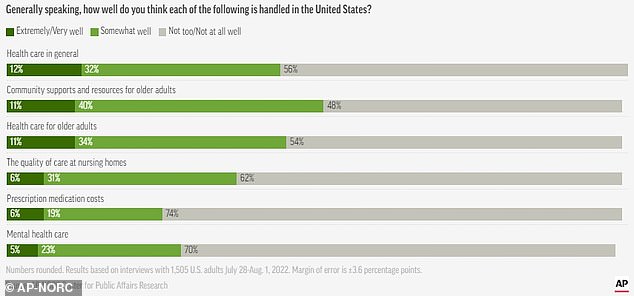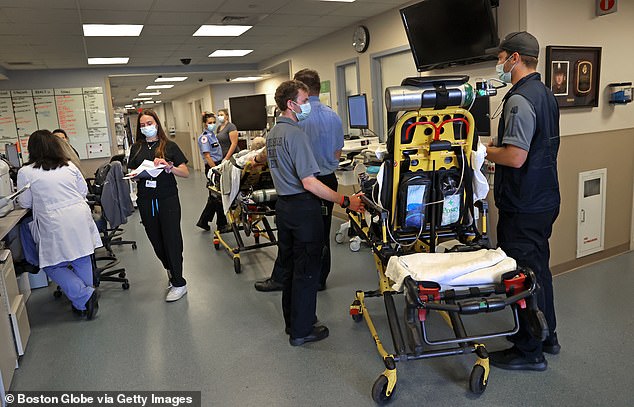More than half bashing the sector and by wide margins knocking nursing homes, prescription drug costs and mental health care.
 An AP-NORC Center for Public Affairs Research survey on Monday found just 12 percent of respondents said health care was handled well in the U.S., and fewer still said nursing homes and mental health care were up to scratch.
An AP-NORC Center for Public Affairs Research survey on Monday found just 12 percent of respondents said health care was handled well in the U.S., and fewer still said nursing homes and mental health care were up to scratch.
The poll of some 1,500 adults shows how an overwhelming majority of Americans, nearly 8 in 10, say they are at least moderately concerned about getting access to quality health care when they need it.
It comes after health systems have struggled to handle everything from Covid-19 to monkeypox, and as hospitals nationwide are beset by staffing shortages and worker burnout from the pandemic.
‘Navigating the American health care system is exceedingly frustrating,’ A. Mark Fendrick, University of Michigan health expert, told AP.
‘The Covid pandemic has only made it worse.’
The eye-watering cost of many prescription drugs has long troubled poorly Americans.
 Former president Donald Trump tried — but largely failed — to tame costs, which are expected to come down due to provisions in President Joe Biden’s so-called Inflation Reduction Act.
Former president Donald Trump tried — but largely failed — to tame costs, which are expected to come down due to provisions in President Joe Biden’s so-called Inflation Reduction Act.
Healthcare, and who pays for it, is another perennial gripe.
Former president Barack Obama’s signature healthcare policy expanded coverage to millions of uninsured, but many want to broaden this further with European-style universal health coverage.
While Americans agree on the woes of the health care system, that agreement dissolves when it comes to solutions to repair it.
About two-thirds of adults say it is the federal government’s responsibility to ensure all Americans are covered — with adults aged 18 to 49 more likely than those over 50 to hold that view.

Staff at South Shore Health in Weymouth, Massachusetts, say the number of ambulances arriving every day increased during the pandemic and has reached new records of some 105 ambulances daily
About 4 in 10 respondents backed a single-payer health care system that would require Americans to get health insurance from a government plan, while 58 percent would support a government scheme that anyone can purchase.
There also is broad support for policies to help people afford long-term care, including a government-led insurance system akin to Medicare, which covers the elderly.
The survey comes in the wake of a glut of negative reports from the healthcare sector, including Amazon’s decision last week to cut 159 jobs and shutter its remote health service, known as Amazon Care, later this year.
A study of more than 500 healthcare professionals last week revealed high rates of ‘burnout and staffing shortages’, said Brett White, interim CEO of Weave, which tracks small businesses.
Researchers found that two thirds of clinics and other small healthcare businesses were short-staffed, and 83 percent of professionals said at least one staff member had left their practice in the past year.
Written bu James Reinl for The Daily Mail ~ September 12, 2022
